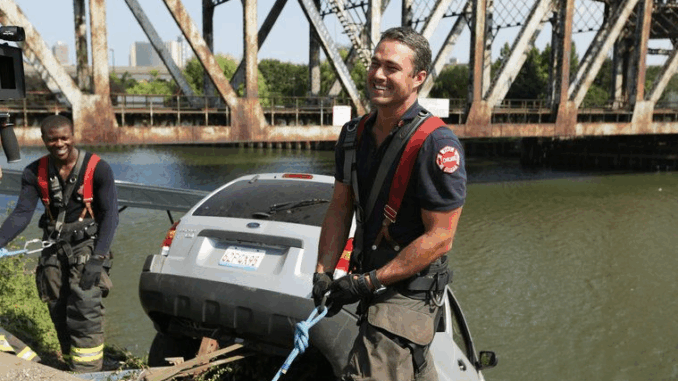
Taylor Kinney was once the face of Chicago Fire. As Kelly Severide, he anchored the drama of Firehouse 51 with a brooding charm and dependable presence that fans grew attached to over more than a decade. But when he quietly exited the series mid-season, the show didn’t just lose a lead—it lost its emotional backbone.
What followed was silence.
No dramatic farewell. No in-universe explanation that satisfied. Just an awkward line about “training elsewhere” and a scramble behind the scenes to fill a void the writers clearly didn’t expect to face.
But now, whispers from inside the production suggest that Kinney’s exit wasn’t as simple as “personal reasons.” And his return—brief, quiet, and oddly lifeless—might not be the redemption arc fans were hoping for.
The Crack Behind the Smile
On screen, Taylor Kinney often played Severide with a quiet intensity. Off screen, his charm earned him respect from fans and cast alike. But in the final stretch of Season 11, something changed. Crew members allegedly noticed he was showing up late to table reads, disengaged from script notes, and avoiding press responsibilities.
While no official scandal broke into public headlines, rumors of creative disagreements and personal burnout began to circulate within production circles. Some even believed he had grown tired of the franchise altogether—but contract obligations kept him tethered.
Whatever the reason, his disappearance from the show wasn’t scripted. It was damage control.
The Storyline That Wasn’t
Writers reportedly had a different arc planned for Severide during the latter half of Season 11—a pivotal storyline involving betrayal, loss, and a major leadership conflict within the firehouse. But with Taylor’s sudden exit, that entire arc was either scrapped or hastily repurposed for other characters.
The fallout was clear: scenes felt disconnected, relationships suddenly shifted, and Severide’s absence was brushed off with a one-line excuse. Even his wife on the show, Stella Kidd, had limited explanation or reaction—creating emotional gaps that fans immediately noticed.
A Return Without Fire
When Taylor Kinney finally returned in Season 12, expectations were high. Would this be the comeback that reignited Firehouse 51’s heart?
Instead, viewers were met with a version of Severide that felt… distant. Flat. Emotionally checked out.
His scenes were fewer, his dialogue minimal. Longtime fans felt the energy shift. He was there, physically—but not present. And rather than returning as a leader, Severide became a background figure, often used only when convenient for plot logistics.
Behind Closed Doors

Behind the scenes, Kinney’s return was met with mixed reactions. Some co-stars reportedly welcomed him back with cautious optimism. Others quietly questioned whether his return was temporary, or even wanted.
Writers were allegedly told to “keep flexibility” in scripts involving his character, unsure if Kinney would remain committed beyond a few episodes. Showrunners had backup plans in motion—just in case he walked again.
The lack of clarity left everyone guessing. Including the fans.
The Future of Severide
With Chicago Fire moving toward its next season, the question looms: Is Kelly Severide still the soul of the show, or is his chapter quietly closing?
If Taylor Kinney’s detachment persists, the writers may be forced to make a difficult call—retire the character completely or risk dragging him through a storyline that no longer fits.
For now, Severide remains on screen… but not at the center. And that’s a loss Chicago Fire still hasn’t recovered from.
Because when the firehouse loses its anchor, it doesn’t explode—it just quietly burns out.